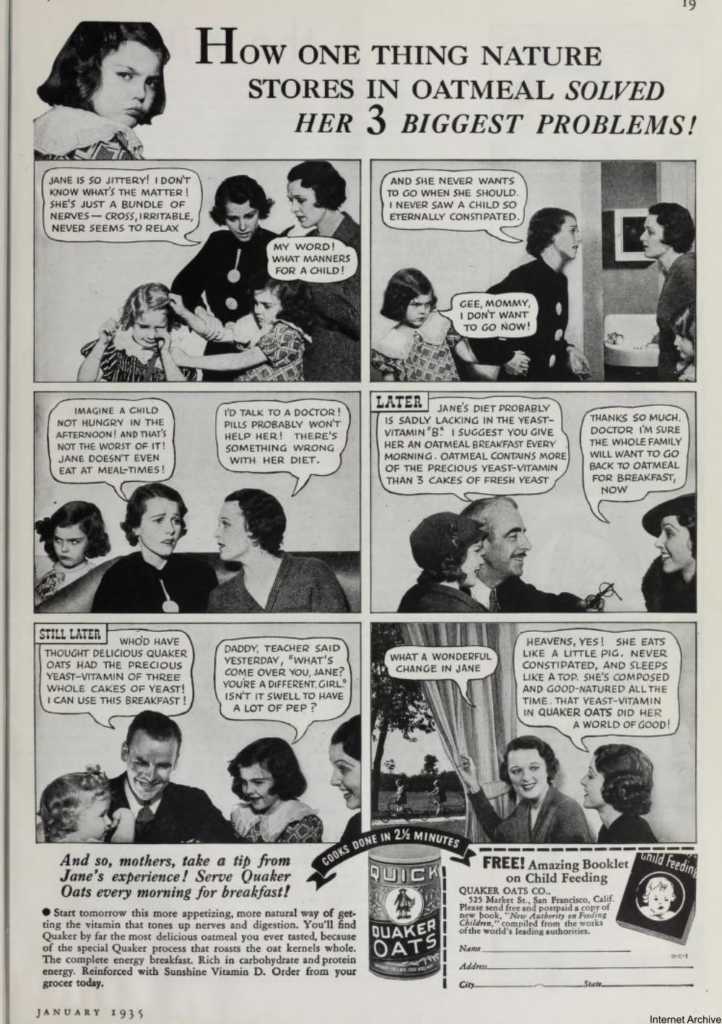The start of the 20th century saw an uptick not only in advertising, but also in prepackaged foods. Companies touted their wares as being simply the best, as having magical powers, as being much finer than they actually were. In the case of breakfast cereals, this was especially true. The new craze of cereal around the turn of the century changed how we viewed the first meal of the day, but maybe not for the better. New research calls into question decades of “common knowledge” that breakfast facilitates weight loss and is generally a good idea for most people to eat.

The Beginning of Cereal Marketing
The Kellogg brothers, inspired by writings of the Seventh Day Adventists and by a long line of authors who claimed that “self-pollution” would be the moral and spiritual downfall of anyone who practiced it, began on a mission to tell the world about the wonders of a “pure” life. One of the tenants of this new way of living -according to thinkers within the church like Sylvester Graham (yes, like graham crackers) and Ellen and James White- was to refrain from eating meat, to cease drinking tea, coffee, and alcohol, and to stay away from tobacco.

The Whites groomed John Harvey Kellogg and even sponsored his medical training. When he returned from medical school, he put into practice the “pure” standards at the Battle Creek Sanitarium where people came from miles to restore their health. Kellogg took these ideas a step further with his notion of eating cereals. His idea was that eating bland foodswould help keep one on the path of righteousness.
The idea that diet could improve one’s moral standing was a widespread idea throughout history. Under the theory of humors certain patients would could change the course of their natural humors by eating certain foods, i.e. beef was prescribedfor depression since it counteracted the cold/dry traits of the dominatn black bile humor with heat and moisture. So the idea that a person’s well-being and behavior could be drastically altered by their diet had been in the realm of common belief for quite some time.

The Great Awakening of the 1800s, along with convenience foods of the early 1900s, made the public receptive to the ideas of purity of food and soul. Kellogg’s partner and brother, Will Keith Kellogg, at first capitalized on this for his new cereal (later called corn flakes) which were marketed as wholesome, powerful foods. Before this grains had mainly been seen as feed for livestock unless baked into bread. The idea that humans should also enjoy such bland and common morsels was a fairly new concept.
Charles William Post, a client at the sanitarium, came out with Grape-nuts in 1895, a brand which later claimed the consumption of their cereal could cure appendicitis. Kellogg’s first cereal (corn flakes) was produced in 1906, after years of serving grain-based foods at the Battle Creek Sanitarium. From then on the cereal game in the U.S. was forever changed. The virtues of eating a good breakfast, and specifically one that included cereal were part of every advertisement for both Post and Kellogg’s.

New Research Questions Breakfast
In years later, research would show that children very much do benefit from eating a highly nutritious breakfast. But, what about adults? As it turns out there have been studies in the past which claimed that adults could lose weight by eating breakfast, as it was believed to “jump start” the metabolism. Now, a new study that published in The BMJ (formerly The British Medical Journal) indicates that is isn’t true and in fact the opposite may be true.
Adults who wouldn’t otherwise eat breakfast could potentially be consuming more calories if they eat breakfast, and this could be especially damaging if those calories come from sugary pastries or other unhealthy breakfast foods. Past studies which linked breakfast with weight loss in adults were funded by cereal companies.

The new study also found that adults who nearly always skipped breakfast did not weigh more, which means that the lack of breakfast has no overall unhealthy impact. The bottom line seems to be that the overall number of calories consumed in one day is the determinant of weight gain, not whether or not those calories are consumed during the first meal of the day.












